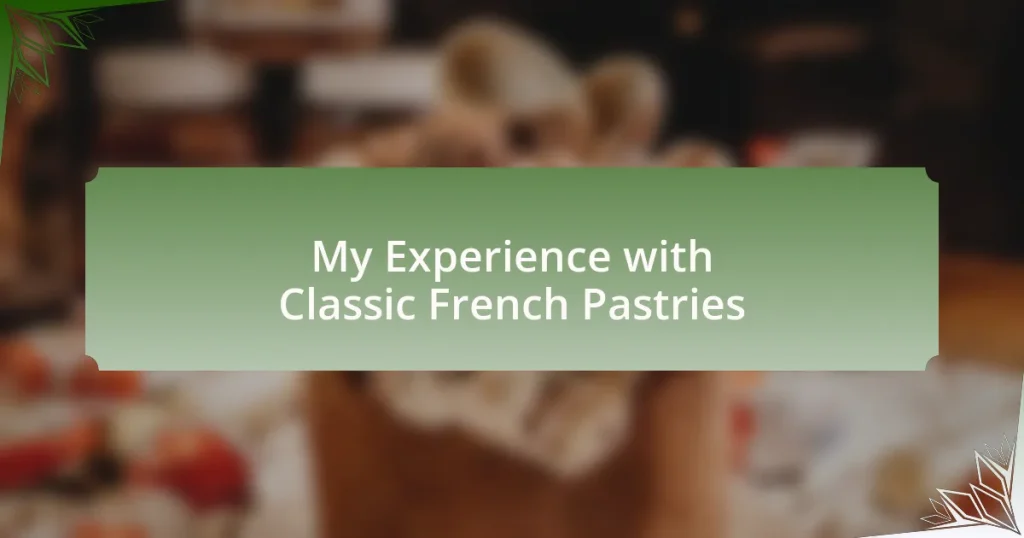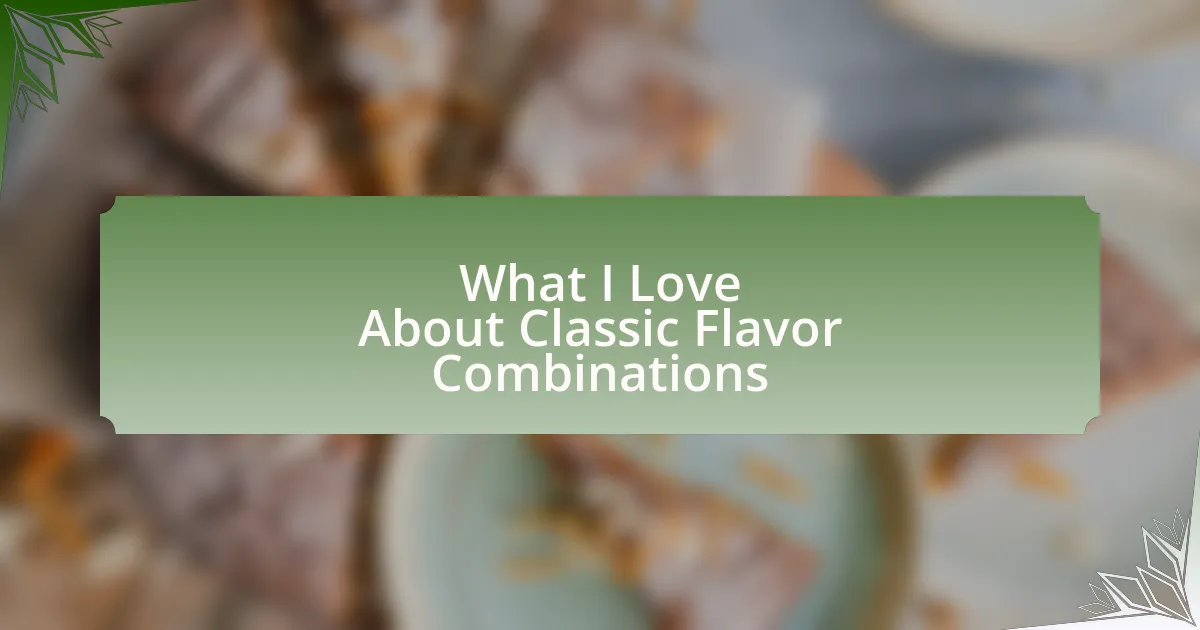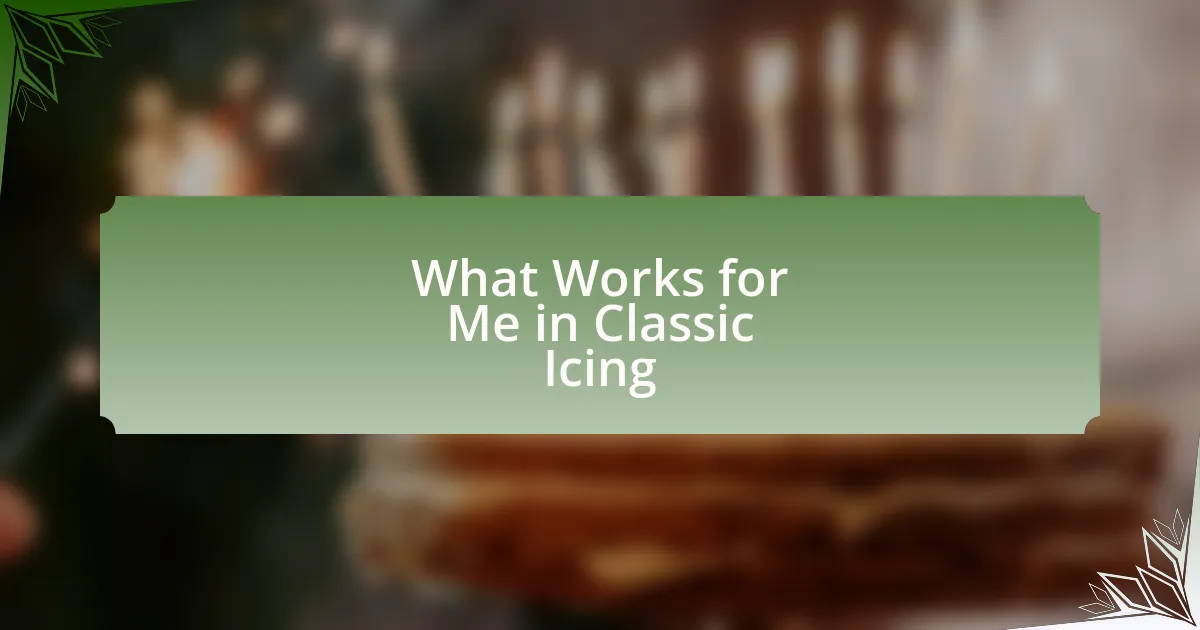Key takeaways:
- French pastries reflect a blend of craftsmanship and personal expression, with each type telling a unique story through its flavors and techniques.
- Wedding cakes symbolize love and unity, serving as focal points during celebrations and often reflecting the couple’s personal journey and heritage.
- Choosing wedding cake flavors can evoke emotions and memories, with a focus on balancing personal favorites and guest preferences for a unique experience.
- The artistic presentation of pastries enhances dining experiences, particularly during significant events like weddings, making them not only delicious but visually appealing.
Author: Evelyn Carter
Bio: Evelyn Carter is an award-winning author known for her gripping psychological thrillers and captivating contemporary fiction. With a background in psychology, she skillfully weaves intricate character studies and suspenseful plots, engaging readers from the first page to the last. Her debut novel, “Shadows of the Mind,” was praised for its sharp insights and unexpected twists, earning her a place among the best new voices in literature. When she’s not writing, Evelyn enjoys exploring the great outdoors and volunteering at her local animal shelter. She lives in Portland, Oregon, with her two spirited rescue dogs.
Understanding Classic French Pastries
When I first encountered classic French pastries, I was immediately struck by their elegance and precision. The delicate layers of a mille-feuille or the glossy finish of a perfectly made éclair seem to whisper stories of craftsmanship and tradition. How can a simple pastry evoke such warmth and delight?
Each French pastry has a unique story tied to its origins and the ingredients used. For example, the flaky, buttery croissant has roots in Austria but became iconic in French culture. I remember savoring one fresh from the oven in a quaint Parisian café, and the experience was nothing short of magical—warm, flaky, and just the right balance of buttery richness.
Understanding these pastries means appreciating not just their taste, but also the meticulous technique involved in their creation. Take macarons, for instance. The process requires precision and patience, and I still recall my first attempt at baking them. They were far from perfect, but that imperfect batch taught me so much about the importance of every step, from folding the batter gently to achieving that signature “foot.” Isn’t it fascinating how baking connects us to tradition while allowing for personal expression?
Importance of Wedding Cakes
The significance of wedding cakes goes beyond mere decoration; they serve as a symbol of love and unity for the couple. I still remember the mesmerizing sight of my friend’s wedding cake, a multi-tiered masterpiece adorned with intricate floral designs that reflected their personal story. It really hit me how a cake can encapsulate the journey of two individuals coming together—what a profound way to celebrate such an important milestone!
Additionally, the cake-cutting ceremony itself is a cherished tradition that fosters connection among guests. I can vividly recall the laughter and cheers when the couple slashed through that stunning cake, creating a moment that everyone would remember. It made me realize that these cakes often are the focal point of the reception, drawing people together and sparking conversations around shared memories and future dreams.
Moreover, wedding cakes often carry flavors that resonate deeply with the couple’s heritage, making them even more special. When I helped select flavors for my cousin’s wedding cake, I was amazed at how the choices made reflected her family’s traditions. It became clear that cakes aren’t just treats; they’re cherished artifacts that weave together the essence of love, family, and joy in one delicious slice.
Popular Types of Wedding Cakes
When it comes to popular types of wedding cakes, traditional tiered cakes often steal the show. I recall attending a lavish wedding where the couple chose a classic white cake adorned with fresh roses. The elegance of that cake was undeniable, and I couldn’t help but admire how it perfectly complemented the overall decor while serving as a centerpiece for the celebration.
Another increasingly trendy option is the naked cake, which gives a rustic and charming vibe. I remember seeing one at a friend’s outdoor wedding, and it struck me how the exposed layers, filled with luscious fruits and cream, felt so inviting. It made me wonder how couples choose the cake that best reflects their love story, as the simplicity of that naked cake aligned beautifully with the couple’s easygoing personality.
Additionally, many couples opt for unique flavors to make their cake stand out. I’ve tasted chocolate raspberry, lemon lavender, and even chai spice cakes at weddings, and each flavor told its own story. Isn’t it fascinating how these delicious choices can spark conversations among guests and create lasting memories? The right flavor can elevate the entire experience, making it even more personal and unforgettable.
Characteristics of French Pastries
The allure of French pastries lies in their delicate texture and intricate craftsmanship. I still remember my first taste of a perfectly baked éclair, with its crisp outer layer and creamy filling that seemed to melt in my mouth. The balance between textures is crucial; it creates a multi-sensory experience that enhances each bite.
Another hallmark of these pastries is the vibrant flavors they showcase. When I indulged in a traditional tarte Tatin, the rich caramelized apples enveloped in buttery pastry captivated my senses. It reminded me just how essential the layering of flavors is in French pastries, turning each dessert into a work of art, meant to be savored slowly.
A distinct feature of French pastries is their artistic presentation. I remember walking by a patisserie in Paris and being entranced by the colorful rows of pastries, each one a masterpiece. The visual appeal draws you in, inviting both admiration and appetite, and it makes me ponder how the aesthetics of a pastry can elevate a dining experience, especially at momentous occasions like weddings.
My Personal Journey with Pastry
My journey with pastries began as a child, watching my grandmother whip up delicate layers of dough in her warmly lit kitchen. The scent of butter and sugar still lingers in my memory; it was intoxicating. Each time she pulled a fresh batch from the oven, I couldn’t help but wonder how something so simple could bring such joy.
As I delved deeper into the world of French pastries, I realized the technique involved is an art form in itself. I vividly recall the first time I attempted to make macarons. The precision required was daunting; I found myself pacing back and forth, questioning whether I could capture that elusive crisp shell with a soft, honeyed center. The surge of joy I felt when I finally succeeded highlighted just how much passion lies in pastry creation.
Reflecting on that experience, I often ask myself: what makes baking so rewarding? For me, it’s not just about the end product but the journey—the mistakes, the triumphs, and the sweet memories created along the way. Each pastry I create tells a story, making my connection to this craft not just about food, but about the moments shared and celebrated with loved ones.
Selecting Wedding Cake Flavors
When selecting wedding cake flavors, I often think back to the variety of tastes that have resonated with me over the years. One particular wedding I attended featured a lavender-infused vanilla cake that beautifully complemented the summer garden setting. The unique flavor not only surprised the guests but also sparked conversations, making it a memorable part of the celebration. Isn’t it fascinating how flavors can evoke emotions and create lasting memories?
For couples, choosing the right flavor can feel overwhelming with so many options available. I remember once being part of a cake tasting where traditional chocolate and red velvet stood alongside lemon and almond variations. Each slice carried a different story, bringing back childhood memories or sparking new sentiments. What I’ve learned is that the best approach is to consider both personal favorites and what resonates with your guests—finding that perfect balance can truly elevate the experience.
It’s also worth noting that incorporating flavors from your personal journey can make your wedding cake feel even more special. Why not think about flavors that symbolize your relationship? For my own celebration, I chose a spiced chai cake that reminded me of cozy evenings spent sipping tea with my partner. This thoughtful touch not only personalized our dessert but also deepened the significance of our special day. After all, a wedding cake is more than just dessert; it’s a representation of your love story.




